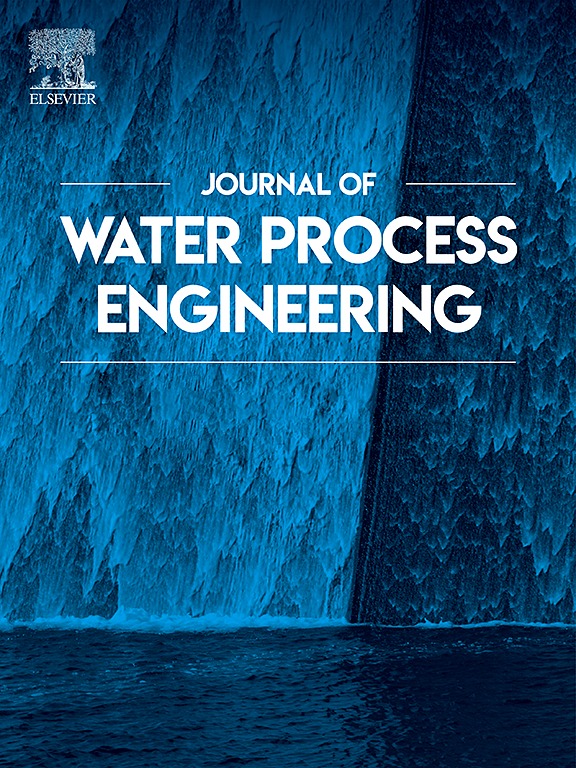机器学习预处理模型在饮用水处理厂O3-BAC工艺中的应用
IF 6.3
2区 工程技术
Q1 ENGINEERING, CHEMICAL
引用次数: 0
摘要
机器学习方法已越来越多地集成到水处理厂的智能控制系统中。然而,其实际实施面临着在线数据准确性不足、关键参数实时监测困难、化学投加系统中过量投加的历史问题以及在波动水质条件下需要进行模型优化等挑战。为了解决这些挑战,本研究开发了一个综合的技术框架,集成了全光谱在线分析仪和预处理系统,包括陶瓷膜过滤和超声波清洗。利用八个月的大规模在线正交实验数据,该框架包括三个核心部分:稳健的数据采集、预测模型库的构建和优化的化学剂量策略。结果表明,长短期记忆(LSTM)算法能有效捕捉时间序列数据的时间动态,在实际操作中表现出优异的稳定性。再训练后,与更新前的基线相比,更新后的LSTM在均方根误差(RMSE)和平均绝对百分比误差(MAPE)方面分别减少了67%和63%。在模型优化之后,提出的框架使饮用水处理厂的预处理化学品剂量成本降低了15%。本研究的主要贡献包括开发了一种快速、抗干扰的在线预处理系统,基于正交实验设计的自适应给药模型,以及将分类建模与优化算法相结合的动态控制策略,以提高给药精度并降低运行成本。本文章由计算机程序翻译,如有差异,请以英文原文为准。
The application of machine learning pretreatment models for O3-BAC process in drinking water treatment plant
Machine learning methods have been increasingly integrated into intelligent control systems for water treatment plants. However, their practical implementation faces challenges such as insufficient online data accuracy, difficulties in real-time monitoring of critical parameters, historical issues of overdosing in chemical dosing systems, and the need for model optimization under fluctuating water quality conditions. To address these challenges, this study developed a comprehensive technical framework integrating full-spectrum online analyzers and pretreatment systems, including ceramic membrane filtration and ultrasonic cleaning. Leveraging eight months of large-scale online orthogonal experimental data, the framework encompasses three core components: robust data acquisition, construction of a predictive model library, and optimized chemical dosing strategies. The results demonstrated that the Long Short-Term Memory (LSTM) algorithm effectively captured temporal dynamics in time-series data, exhibiting superior stability during practical operation. Post-retraining, the updated LSTM achieved remarkable error reductions of 67 % in Root Mean Square Error (RMSE) and 63 % in Mean Absolute Percentage Error (MAPE) compared to the pre-update baseline. Following model optimization, the proposed framework achieved a 15 % reduction in pretreatment chemical dosing costs at the drinking water treatment plant. The main contributions of this study include the development of a rapid and interference-resistant online pretreatment system, an adaptive dosing model based on orthogonal experimental design, and a dynamic control strategy that combines classification modeling with optimization algorithms to enhance dosing accuracy and reduce operational costs.
求助全文
通过发布文献求助,成功后即可免费获取论文全文。
去求助
来源期刊

Journal of water process engineering
Biochemistry, Genetics and Molecular Biology-Biotechnology
CiteScore
10.70
自引率
8.60%
发文量
846
审稿时长
24 days
期刊介绍:
The Journal of Water Process Engineering aims to publish refereed, high-quality research papers with significant novelty and impact in all areas of the engineering of water and wastewater processing . Papers on advanced and novel treatment processes and technologies are particularly welcome. The Journal considers papers in areas such as nanotechnology and biotechnology applications in water, novel oxidation and separation processes, membrane processes (except those for desalination) , catalytic processes for the removal of water contaminants, sustainable processes, water reuse and recycling, water use and wastewater minimization, integrated/hybrid technology, process modeling of water treatment and novel treatment processes. Submissions on the subject of adsorbents, including standard measurements of adsorption kinetics and equilibrium will only be considered if there is a genuine case for novelty and contribution, for example highly novel, sustainable adsorbents and their use: papers on activated carbon-type materials derived from natural matter, or surfactant-modified clays and related minerals, would not fulfil this criterion. The Journal particularly welcomes contributions involving environmentally, economically and socially sustainable technology for water treatment, including those which are energy-efficient, with minimal or no chemical consumption, and capable of water recycling and reuse that minimizes the direct disposal of wastewater to the aquatic environment. Papers that describe novel ideas for solving issues related to water quality and availability are also welcome, as are those that show the transfer of techniques from other disciplines. The Journal will consider papers dealing with processes for various water matrices including drinking water (except desalination), domestic, urban and industrial wastewaters, in addition to their residues. It is expected that the journal will be of particular relevance to chemical and process engineers working in the field. The Journal welcomes Full Text papers, Short Communications, State-of-the-Art Reviews and Letters to Editors and Case Studies
 求助内容:
求助内容: 应助结果提醒方式:
应助结果提醒方式:


